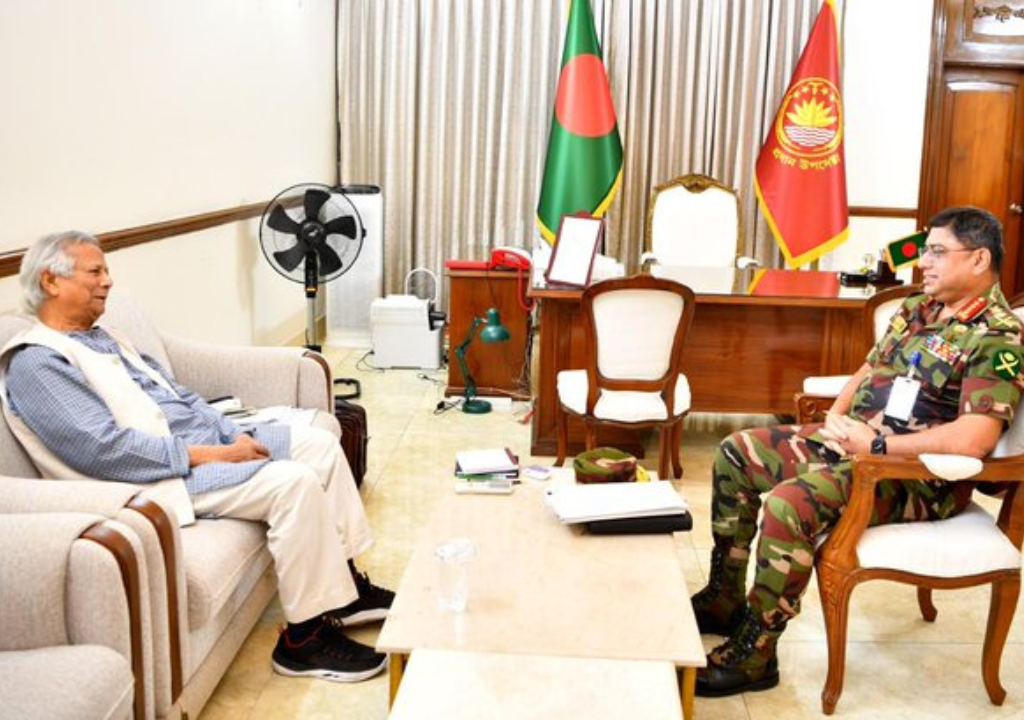The unfolding Bangladesh political crisis 2025 has taken a serious turn as Army Chief General Waker-Uz-Zaman publicly expressed dissatisfaction with the interim leadership of Muhammad Yunus. Amid growing national instability, sharp differences have emerged between the country’s armed forces and the civilian interim administration—mainly over governance decisions, military oversight, and delayed elections.
With reports of civil unrest, an uncertain democratic transition, and rising geopolitical interest from neighboring powers, Bangladesh now finds itself at a pivotal crossroads.
Growing Rift Between Military and Government
General Waker-Uz-Zaman has reportedly voiced concerns over key decisions made by the Yunus-led interim government without involving the military. Addressing top officials in Dhaka, the army chief criticized the interim leadership for keeping the armed forces in the dark, undermining transparency and cooperation during a national security-sensitive period.
The military, which stepped in to stabilize law and order after the collapse of civilian policing post-2024, now feels increasingly sidelined.
Links Suggested: Digital India and Cyber Security: Balancing Innovation and Protection
Opposition to the Myanmar Corridor Plan
Adding fuel to the crisis, the army chief also rejected a controversial proposal for a “humanitarian corridor” along the Myanmar border, calling it a threat to Bangladesh’s sovereignty and territorial integrity. The plan aimed to provide safe passage for aid delivery into Myanmar’s Rakhine State, which has seen widespread conflict.
General Waker-Uz-Zaman dismissed the corridor, saying “no bloody corridor will be allowed,” drawing a firm line on potential entanglements in Myanmar’s internal crisis. Notably, the country’s National Security Adviser (NSA) later stated that the corridor idea had never been officially endorsed.
Call for Timely Elections by December
In a bold move, General Waker-Uz-Zaman has demanded that general elections be held by December 2025, asserting that only an elected government has the moral and legal authority to lead the country. This is the strongest signal yet from the military establishment that it does not endorse a prolonged interim rule under Yunus.
The general emphasized that the army would not tolerate further mob violence, lawlessness, or manipulation of the electoral timeline, which has already drawn criticism from political parties and civil society groups.
Links Suggested: Bhashini AI: Can India Create Its Own ChatGPT Alternative?
Backdrop: Collapse of Civil Order Post-Hasina
Following the ousting of former Prime Minister Sheikh Hasina in August 2024, Muhammad Yunus was appointed head of the interim administration. However, the law-and-order situation rapidly deteriorated, with reports of politically motivated violence, police disarray, and rising criminal activity.
The military stepped in to fill the power vacuum, and has since taken a prominent role in maintaining order across major cities. However, its involvement has also raised questions about the military’s role in civil governance and future elections.
Geopolitical Undercurrents and Foreign Interests
The Bangladesh political crisis 2025 is not just a domestic affair—it carries international implications. Reports suggest that China and Pakistan are backing Yunus to continue in power beyond constitutional limits, while India has taken steps to restrict Bangladeshi imports, signaling diplomatic unease.
As Bangladesh becomes a geopolitical battleground, regional powers are closely watching the evolving civil-military dynamics and their potential impact on trade routes, border security, and strategic alliances.
Military Message: Sovereignty and 1971 Legacy Non-Negotiable
A senior unnamed military official added symbolic weight to the army chief’s statements, emphasizing that the legacy of Bangladesh’s 1971 Liberation War and the nation’s sovereignty are non-negotiable. This was interpreted by analysts as a thinly veiled warning to the interim leadership not to compromise on issues of national pride and military oversight.
The armed forces remain deeply rooted in the national narrative of independence and are unlikely to accept any policy perceived to dilute that legacy.
Conclusion
The Bangladesh political crisis 2025 is deepening, with the armed forces and interim civilian government on a collision course. With elections looming and international scrutiny intensifying, the future of Bangladesh’s democratic transition remains uncertain.
For now, the military’s demand for a return to elected governance by December and resistance to foreign-backed policy proposals signals a push for restoring balance. Whether Muhammad Yunus complies or confronts the military further may define Bangladesh’s political trajectory for years to come.

